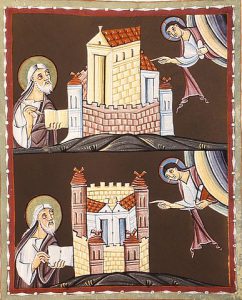 The promise of white garments is also the first element of Jesus’ promise to the conquerors. Revelation 3:5 says, “The one who conquers will thus clothe himself in white garments and I will certainly not erase his name from the book of life and I will confess his name before my Father and before his angels.” The second two elements of Jesus’ promise focus upon their name, which fits with the letter’s play on the word name (3:1, 4, 5). The promise not to “erase his name from the book of life” is an allusion to an expression that one finds in Exodus 32:32 and Psalm 69:28. In both of those cases, the book of life probably has to do with the record of those who are living. The erasure of one’s name has to do with death. This is the aspect of the image that Jesus would appear to be picking up on. He sets forth his promise of eternal life to his conquerors by strongly negating its opposite. This is an example of the literary figure called litotes. His use of the image is somewhat complicated, because it prompts the informed reader to think about “the book of life of the Lamb” in Revelation. In the Lamb’s book, the names of his people are written “from the foundation of the world” (13:8, 17:8). How could one’s name possibly be erased from that book? John would approach this seeming tension by affirming that divine election will never make an error. The Lamb’s elect will all become his conquerors, who demonstrate by their conduct that they are the ones chosen “from the foundation of the world” (13:8; 17:8). Jesus’ final promise in Revelation 3:5, like his words about coming like a thief, repeats a promise that he once made to his disciples (Matt. 10:32; Luke 12:8). This time the key word name (“confess his name”) is repeated with reference to the Son’s acknowledgement of his own before his Father in heaven.
The promise of white garments is also the first element of Jesus’ promise to the conquerors. Revelation 3:5 says, “The one who conquers will thus clothe himself in white garments and I will certainly not erase his name from the book of life and I will confess his name before my Father and before his angels.” The second two elements of Jesus’ promise focus upon their name, which fits with the letter’s play on the word name (3:1, 4, 5). The promise not to “erase his name from the book of life” is an allusion to an expression that one finds in Exodus 32:32 and Psalm 69:28. In both of those cases, the book of life probably has to do with the record of those who are living. The erasure of one’s name has to do with death. This is the aspect of the image that Jesus would appear to be picking up on. He sets forth his promise of eternal life to his conquerors by strongly negating its opposite. This is an example of the literary figure called litotes. His use of the image is somewhat complicated, because it prompts the informed reader to think about “the book of life of the Lamb” in Revelation. In the Lamb’s book, the names of his people are written “from the foundation of the world” (13:8, 17:8). How could one’s name possibly be erased from that book? John would approach this seeming tension by affirming that divine election will never make an error. The Lamb’s elect will all become his conquerors, who demonstrate by their conduct that they are the ones chosen “from the foundation of the world” (13:8; 17:8). Jesus’ final promise in Revelation 3:5, like his words about coming like a thief, repeats a promise that he once made to his disciples (Matt. 10:32; Luke 12:8). This time the key word name (“confess his name”) is repeated with reference to the Son’s acknowledgement of his own before his Father in heaven.
It is important to notice that Jesus’ instruction to the Sardis church refers twice to the teaching that he once gave to his disciples (3:2-3, 5). In both cases, the teaching is found in Matthew and Luke, but not in John. Thus, it seems that Jesus expects the churches of Revelation to be familiar with his teaching passed down to them through his apostles, and not just through the writings of John.
Sources:
These paragraphs are slightly edited portions of my book:
Paul Hoskins, The Book of Revelation: A Theological and Exegetical Commentary, pp. 104-105 (those pages provide further sources and footnotes that I have omitted above).
